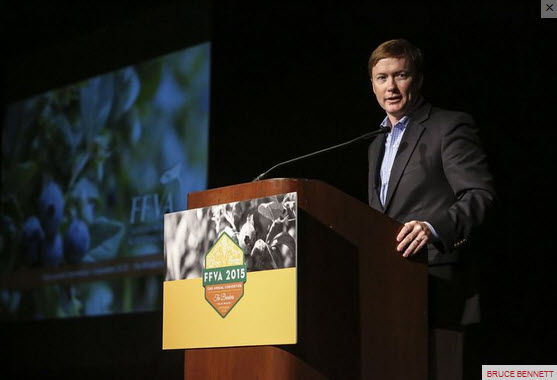Florida is a battleground for agricultural pests and diseases from other countries, and the situation is going to worsen when more imports arrive via the Panama Canal and travel to and from Cuba increases, Florida Agriculture Commissioner Adam Putnam said Wednesday.
More than 400 people, including Palm Beach County sugar cane and vegetable growers, are attending the meeting that ends Friday.
In Miami-Dade County alone, the state is responding to the largest Oriental fruit fly outbreak ever and is working to eradicate the giant African land snail. In addition to consuming plants, the snail eats the stucco off of houses and carries a parasite that can spread meningitis. Avocado growers are also fighting laurel wilt disease, which kills the trees.
“When I share these kinds of stories with the commissioners from the 50 states, they look at me like I’ve got a third eye,” Putnam said.
“The doubling of the Panama Canal and the investment that the state is making in our seaports to receive more of that cargo, by volume, will increase the risk, “Putnam said. “That volume will substantially originate from Asia.”
Container loads of goods from Asian markets will come straight into Florida rather than into Long Beach, Calif., as they do now.
Florida is getting way too much practice at combating pests and diseases which threaten crops and other plants, and has become really good at it, Putnam said.
“It’s only going to get worse when daily ferry service to Cuba begins. We have no idea how many of the things we have kept out of our state are endemic in that country,” Putnam said, adding that the University of Florida is sending a team of entomologists to Cuba to assess the situation.
There’s an ever-present threat moving forward, and it will worsen unless the federal government changes the way it responds to the pests and builds in the costs of increased risk. “The taxpayers of Florida can’t keep bearing the brunt of the cost of introductions coming in through the federal gaps in the protection system,” Putnam said.
The state’s biggest long-term issue is water, and a comprehensive science-based water policy is needed, Putnam said. Florida faces a 1 billion gallon a day water shortfall by 2030.
The water supply affects every resident and every aspect of commerce from agriculture to development, real estate, tourism and beaches.
“If we mess this up, we have lost the golden goose that is Florida,” Putnam said.
Putnam said his department is working with the U.S. Food and Drug Administration on the new Food Safety Modernization Act and is concerned that the federal mandate is not sufficiently funded. The rules must be applied equally to both imported food and food produced in the U.S.
“Not only does Congress have to put the resources behind this, but don’t expect the states to pick up all the costs of regulation and enforcement on this,” Putnam said. “We know it’s going to be harder to do it overseas.”
